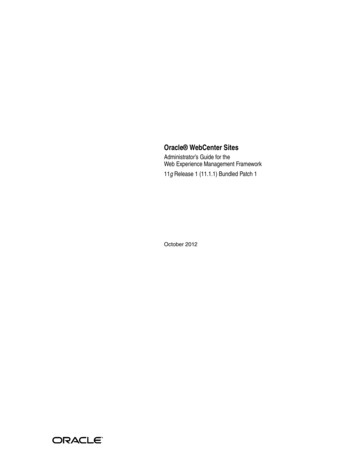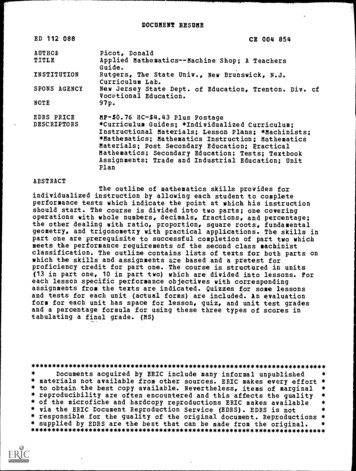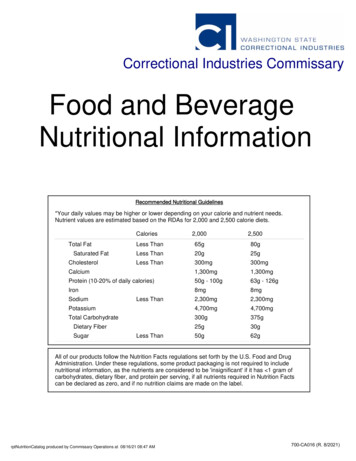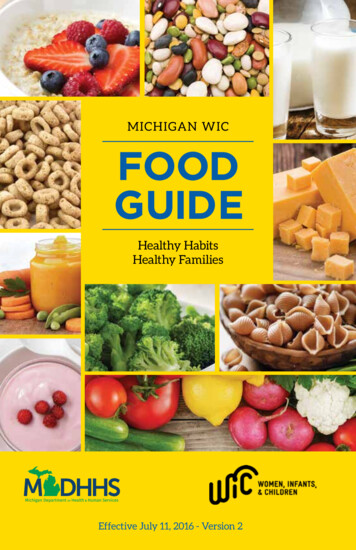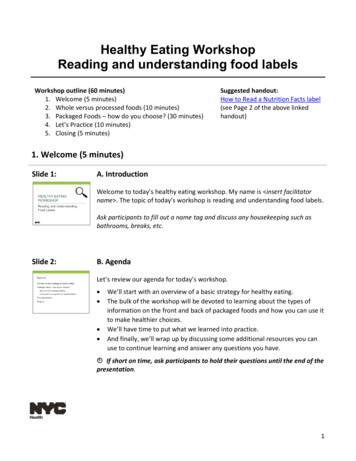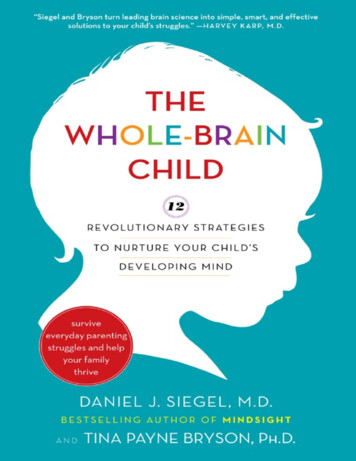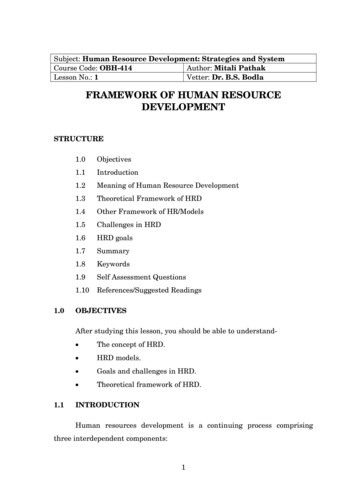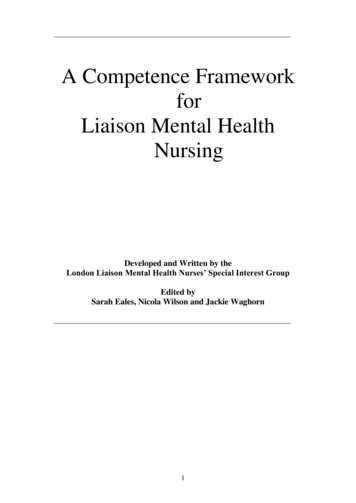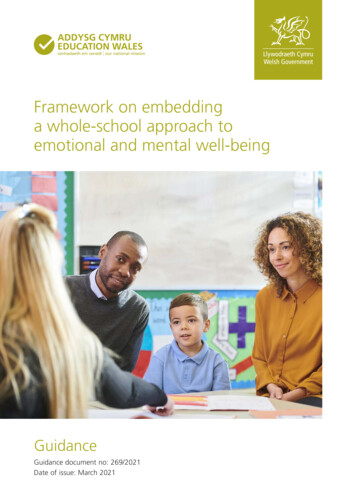
Transcription
Framework on embeddinga whole-school approach toemotional and mental well-beingGuidanceGuidance document no: 269/2021Date of issue: March 2021
Framework on embedding a whole-school approach toemotional and mental well-beingAudienceThis Framework is aimed at the needs of school-age learners and the workforce supportingtheir learning and well-being needs. However, much of the content is also applicable in othersettings that deliver education where children and young people require well-being supportto fully engage in their learning and to develop. There are a range of intended audiences andpartners involved in delivering this Framework, set out on page 11.OverviewThe Framework is intended to support schools, including pupil referral units (PRUs) andeducation settings in reviewing their own well-being landscape and in developing plans toaddress their weaknesses and build on their strengths. It recognises that the school alonecannot meet all the needs of a complex population of children and young people, and setsout the role of regional bodies, the NHS and others such as the third sector, in supportingthe school. It is meant to support and complement the new national Curriculum for Walesand in particular the Health and Well-being Area of Learning and Experience.Action requiredSchools and local authorities are required to have regard to this Framework when developingaction plans, strategies and other policies that impact on the well-being of learners, staff andothers working within the school environment.In addition, local authorities should have regard to this Framework when organising ordelivering educated other than at school (EOTAS) provision.Further informationEnquiries about this document should be directed to:Health and Well-being in SchoolsSupport for Learners DivisionWelsh GovernmentCathays ParkCardiffCF10 3NQe-mail: mentalhealth.schools@gov.wales@WG EducationFacebook/EducationWalesAdditional copiesThis document can be accessed from the Welsh Government’s website ach-emotional-and-mental-well-beingMae’r ddogfen yma hefyd ar gael yn Gymraeg.This document is also available in Welsh. Crown copyright 2021WG42005Digital ISBN 978 1 80082 886 5
Contents1. Ministerial foreword2. Executive summaryDelivering the whole-school approachEvaluationGovernance and accountability3. Intended audienceWhat legislation is this guidance issued under?4. Background4.1 The whole-school approach, and a blended learning approach4.2 Purpose4.3 Key actions/requirements4.4 Context4.5 Importance of good emotional and mental health and emotional well-being4.6 Review and implementation5. Introduction and application5.1 Overarching principles5.2 Values5.3 Local and regional support5.4 Application in EOTAS and PRUs5.5 Application in relation to elective home education5.6 Application in early years settings5.7 Meeting the needs of Welsh language and others for whom English is not theirfirst languageStep 1357910111213131415161921222222232526266. Scoping stage6.1 Evaluation6.1.1. Self-evaluation6.2 Direct observations and people’s views6.2.1 Estyn evaluations6.3 Quantitative data6.3.1 School Health Research Network (SHRN) data6.3.2 School-based management and regional data6.3.3 Welsh Network of Health School Schemes (WNHSS)6.3.4 Local authority activityStep 229292930303131323233347. Action plan and implementation7.1 School ethos7.2 Curriculum7.3 Staff well-being343436372629
7.4 School environment7.5 Timing of the school day7.6 The importance of play7.7 Information, awareness raising and advocacy7.8 Universal provision7.9 Targeted provision7.10 Provision for children and young people with specific needs7.11 Self-harm and suicide7.12 Provision for vulnerable children and young people7.13 Transition7.14 Leadership and staff training7.15 The role of youth work7.16 Whole-system roles and responsibilities, and relationships with external servicesand parents/carers7.16.1 Together for Children and Young People Programme (T4CYP(2))7.16.2 The role of parents and carersStep 33939404143454647484950537.17 Evaluation and coproduction7.18 Governance and accountabilityAnnex 1: Implementing whole-school approaches in Wales (examples)A. Mind Cymru’s whole-school approach to mental healthAim of our approachMind’s modelImpact of the approachB. The Exchange and Swansea local authority whole-school approach to supportingpsychological well-being in primary schoolsPhase 1 – Whole-school training and proactive interventionsPhase 2 – Recognising struggles and Identifying need in terms of being ‘underresourced’Phase 3 – Schools investing in enhancing skill sets for supporting psychologicalwell-beingAnnex 2: The strategic and legislative frameworkLegislation, strategy and guidance that supports the whole-school approach6060626262636453565760646566666767
1. Ministerial forewordIf 2020 has taught us anything, it is the importance of maintaining our emotional andmental well-being. None of us could have foreseen the way COVID-19 would affectour lives and even the most resilient of us will have struggled and experienced poorwell-being at times.These are normal emotions and reactions to uncertainty and anxiety about theimpact COVID-19 could have on our own health and the health of family and friends;concerns about its impact on our future, as we witness society change in ways inwhich we could never have thought possible; worries about having to endureenforced separation from family and friends for long periods; and sadly, for some ofus, having to endure the impact of loss and bereavement as a result of the virus.Thankfully, as we start 2021 with the rollout of the COVID-19 vaccines, there is hopethat at some point in the near future our lives will return to normal. However, it willnot be the same and the emotional scars and impact of COVID-19 are likely toremain with us for some time. This will require additional effort from all of us tosupport and improve the emotional well-being of the individual and the nation. If wecan take positives from the last year let it be that the spotlight is now firmly focusedon emotional and mental well-being and, in particular, the well-being of children andyoung people and the role of schools in supporting and building positive well-being.Our children and young people already have so much to cope with, whether it be thestresses of growing up in an uncertain world, added pressures such as familycircumstances, poverty, physical and mental impairment, housing, access totransport and facilities which many of us take for granted, or their physicalenvironment. All of these can influence children and young people’s emotional andmental well-being.As a result of our cross-governmental strategy Together for Mental Health (2012) wehave made good progress in addressing many of the negative factors in recent yearsand education is playing its part, in particular through development of our newcurriculum. The development of 'healthy confident individuals’ is one of the fourpurposes of the new curriculum and the Health and Well-being Area of Learning andExperience is about developing the capacity of learners to navigate life'sopportunities and challenges.The Welsh Parliament’s Children, Young People and Education Committeeacknowledges the progress that has been made in its Mind over matter: Two yearson 1 (2020) report. This Framework is central to that progress and supports schools,local authorities (LAs) and partners in developing consistent and equitable wholeschool approaches to well-being. It builds on the many examples of good practicealready occurring across Wales and it is not a standalone document. It iscomplemented by the work of the Together for Children and Young 13568/cr-ld13568-e.pdf3
Programme (T4CYP(2)); together, they support the ‘whole system’ approach tochildren’s well-being.This Framework was consulted on between July and September 2020 and 142responses were received. We want to thank the many respondents from across thespectrum of Welsh life, including the many individual children and young people,parents/carers, teachers and clinicians who responded. You have helped shape thefuture of well-being provision for children and young people for the better.Kirsty WilliamsMinister for EducationEluned MorganMinister for Mental Health, Well-being andthe Welsh Language4
2. Executive summaryThis Framework is issued as statutory guidance to governing bodies of maintainednursery, primary, secondary, middle, pupil referral units (PRUs), and special schoolsand local authorities in Wales. It is also intended for use by the range of partnerswho work in and with schools to support the emotional and mental well-being oflearners and staff. While written primarily for schools much of the content and thefocus on well-being is equally applicable in other settings such as childcare settingsthat deliver the Foundation Phase, further education (FE) and higher education (HE).It aims to address the emotional and mental well-being needs of all children andyoung people, as well as school staff, as part of the whole-school community. It alsorecognises that the school alone cannot meet all the needs of what is a complexpopulation of young people, whose needs will vary as they progress through infancyto adolescence and early adulthood. It is not about medicalising well-being; rather itis about taking account of the continuum of need. Primarily it is about buildingresilience and ensuring preventative action. However, there is also a need torecognise the signs and address poor well-being when it arises and to ensureeffective support for schools and the learner when a learner experiences moresevere distress. School staff well-being is also central to the Framework, recognisingthe link between learner well-being and the well-being of the adults they havefrequent contact with. Effective learning is most likely to occur in an environmentwhere all are engaged.The whole-school approach seeks to support good emotional and mental well-beingby promoting a positive cultural environment in schools, where children and youngpeople form positive relationships with staff and other learners, and relationships arestrengthened: between teaching staffwith the school senior leadership team and wider school staffwith parents and carerswith other professionals working with the schoolwith the wider community that surrounds the school.It is about embedding good well-being through teaching as well as all the otheraspects of school life. It is an ethos that: values inclusion, where everybody works together, contributing their individualskills and resources to the collective good creates a supportive environment where young people are encouraged to fulfiltheir personal and academic potential, where they thrive, learn and emotionallydevelop, supported by teachers who operate in a culture that equally values theirown well-being.The Framework places a number of actions and requirements on schools andpartners, including the following.5
All partners/stakeholders involved in the delivery of this Framework should beopen and responsive to each other and be clear on their roles and responsibilitiesin meeting the emotional and mental well-being needs of children. Within the school, delivering the approach involves collaborative and sustainableeffort involving all members of the school community; it is the responsibility of thegoverning body, senior management team, teaching and support staff. Schools,led by the governing body and headteacher, need to make a strong statement thatwell-being supports academic attainment and wider benefits to community andsociety, both in the here and now as well as in the future. This should berecognised in schools’ developmental plans and relevant documentation.Developing children and young people who have an understanding of their ownwell-being is an important outcome in itself. Partners/stakeholders should involve and engage children and young people tounderstand this Framework. Children and young people should have a route to tellpartners/stakeholders what they think about the arrangements being put in placeand what is important to them within the Framework. While delivering this Framework is everybody’s business, school governing bodiesand headteachers, particularly in larger schools, should appoint a named personto lead implementation and act as coordinator to engage with other staff, learners,parents/carers and external agencies. This individual may already haveexperience of such work in relation to coordinating the Welsh Network of HealthSchool Schemes (WNHSS) activity, or leading pastoral care, for example. This Framework is not intended to be overly bureaucratic (effectiveimplementation and delivery may bring benefits, for instance in teachers feelingmore supported in the classroom). Wherever possible, existing deliverymechanisms should be used for delivery of this Framework. In delivering children’s and young people’s universal and targeted interventions,or any interventions aimed at improving teacher knowledge and understanding oftheir own and children’s well-being, the school’s senior leadership team willensure that only those interventions with a sound or innovative and developingevidence base are delivered. Schools (the whole academic and support staff, led by the senior leadership team)should implement and integrate this Framework, making links with theircurriculum. Linked to the school improvement planning cycle, the school’s senior leadershipteam will undertake a review of learners’ emotional and mental well-being needsand implement a plan to address issues and build on areas of strength. The school’s senior leadership team should engage partners and their learners tokeep activity against this Framework under review and in line with the Childrenand Young People’s National Participation Standards 2 and National Principles forPublic Engagement in Wales 3. Local authorities should have regard to this Framework when organising ordelivering educated other than at school (EOTAS) provision. This Framework will be kept under review and evaluated to ensure it is fit forpurpose. The first such review will occur during late 2022, taking account of .uk/principles6
learning arising from having implemented the Framework for a full academic year(2021–22).Core valuesThe Framework is based on the core values of belonging, efficacy and having yourvoice ow does your schoolDo I role model thecontribute to a sense of behaviour I want to seebelonging?at all levels of theschool and buildrelationships based onrespect, trust andfairness?VoiceDo I make space forconversations, givingand receivingconstructive feedback,acting on the views ofothers to help us be atour best more of thetime?Do I have the time tolisten to the youngpeople in my care andadvocate for themwhen needed?All staffAm I aware of the wellbeing needs of mylearners andcolleagues?Do I understand myown well-being needsand the impact mywell-being has onthose around me?LearnersDo I feel safe, valued,treated with respect,connected andsupported while atschool?Do I have self-esteem,aspirations, selfconfidence andempathy? Am I able toform and maintaintrusting relationshipswith peers? Do I knowthere are adults I cantrust and talk to when Ineed to?Do I feel supported tospeak my mind, safe inthe knowledge that myviews are given dueconsideration?Parents/carers/familyWhat contribution can Imake to both my childand my child’s peers’well-being, both in andoutside school?Am I able to positivelyinfluence my child in ahealthy and success‐promoting manner andmaintain beneficial tiesto the school to supportand promote widercommunity benefits?Do I feel confident andable to raise anddiscuss issues andknow how to navigatea system that workswith me to findappropriate supportwhen needed?Delivering the whole-school approachIt provides a defined process for schools to develop and embed their own wholeschool approaches which is consistent, equitable for learners and staff and which isnot intended to be overly bureaucratic, rather working in common with existingschool improvement processes. It is about emphasising the good things that weshould all be doing as a matter of course.7
The Framework enables schools to scope their need, mapping their strengths andweaknesses, using the range of data they have available to them, including internaland external sources and benchmarking data from schools within their own region.They will be supported by dedicated implementation leads, funded by the WelshGovernment and embedded within the WNHSS. The implementation leads aredeveloping an assessment tool to support the process; it will inform the school’saction plan, build on successes and seek to address gaps. The intention is that thisbecomes part of continuous improvement, embedded within the school ethos.The action plan will take account of: the whole-school ethos the whole-school curriculum and in particular the Health and Well-being Area ofLearning and Experience staff well-being the whole-school school environment the whole-school provision of information, awareness raising and advocacy8
the whole-school provision of universal and targeted supportthe whole-school provision for children and young people with specific needsthe whole-school provision for vulnerable children and young peopletransition between education settings (i.e. home to school, primary to secondaryand school to FE/HE, training or employment) leadership and staff training. It also considers: how the school works with partners, including the role of youth work the whole system roles and responsibilities relationships with external services, including the work of the T4CYP(2).In developing this Framework we are not starting with a blank sheet of paper andthere are many examples of good practice across Wales upon which to draw. TheFramework includes many case studies of good practice, as well as two examplesprovided by MIND and The Exchange, in partnership with Swansea LA, ofimplementing whole-school approaches to help inform activity.Whole system approachIn reality, the whole-school approach is part of a much wider whole-system approachto meeting the well-being needs of children and young people. In this respect it isintegral and codependent on the work of the NHS-led T4CYP(2).T4CYP(2) is a Welsh Government priority with cross-cabinet commitment. It aims toimprove the emotional well-being and mental health services/support for children andyoung people, through coproduction with those with lived experience, their families,communities, NHS health boards, local authorities and the third sector. T4CYP(2)has three areas of focus: early help and enhanced support (EHES) neurodevelopmental services Regional Partnership Boards (RPBs).EvaluationSchool senior leadership teams should evaluate the effectiveness of their plan aspart of wider school improvement to ensure it is meeting their requirements, involvingall parts of the school population of learners and staff in the evaluation. Learners, inparticular, should not be considered as passive recipients only, rather they should beseen as valued contributors. As such, they should be involved at the very outset ofand throughout the school’s establishment and implementation of its whole-schoolapproach. Estyn’s Healthy and happy (Estyn, 2019) highlights the importance thatstaff and leaders place on listening to learners, not just on having systems in placefor pupil representation.9
Governance and accountabilityThe Framework also includes our proposals for governance and accountability,reflecting how schools should ensure adherence to the Framework and howconsistency will be ensured at the regional and national levels.10
3. Intended audienceA range of audiences and partners will be involved in delivering this Framework,including: all maintained school senior leadership teams (headteachers, teachers-in-chargeof PRUs, deputy heads and departmental heads) and wider school staff (teaching,administrative, etc.) governing bodies of maintained nursery, primary, secondary, middle and specialschools local authority directorates of education and regional consortia local health board primary and secondary care services local authority children’s and social services local authority young carers’ services parents/carers plus the wider school community youth services, youth workers, youth offending teams and youth work organisations(both voluntary and LA) youth offending institutes and secure children’s homes local authority Families First leads childcare settings, especially those that deliver the Foundation Phase playworkers and play organisations third sector organisations delivering both early education and education supportservices children and young people within maintained schools children and young people in EOTAS and PRUs independent schools advocacy providers while not specifically intended for FE and HE, the issues in this document are ofequal value in those education settings and complement existing guidance suchas the Public Health Wales Healthy and Sustainable Colleges and UniversitiesFramework 4.This document contains both statutory guidance and non-statutory advice.The whole of this document is issued as statutory guidance to: governing bodies of maintained nursery, primary, secondary, middle and specialschools, as well as of PRUs local authorities in Walesand provides non-statutory advice to other persons, including health professionals,or bodies who may have a role in helping to support the mental health and emotionalwell-being of learners in maintained schools and other education pdf11
Local authorities and governing bodies must have regard to this statutory guidancewhen carrying out their duties in promoting the welfare of children who are learnersat the education setting, including meeting their mental and emotional well-beingneeds. The guidance also applies to activities taking place off-site as part of normaleducational activities.Other bodies should have regard to this guidance.What legislation is this guidance issued under?Section 175 of the Education Act 2002 5 places a duty on local authorities andgoverning bodies to make arrangements to ensure their functions are exercised witha view to safeguarding and promoting the welfare of children in school or anotherplace of learning. This includes supporting the mental health and emotional wellbeing of learners.In meeting the duties under section 175 of the Education Act 2002, local authoritiesand governing bodies must have regard to guidance issued by the Welsh Ministersunder this section.Section 21(5) of the Education Act 2002 places a duty on governing bodies topromote the well-being of learners at the school as far as related to the mattersmentioned in section 25(2) of the Children Act 2004, which includes physical andmental health and emotional well-being, education, training and recreation, andsocial well-being.The non-statutory advice contained within this document is issued in exercise of theWelsh Ministers’ duty to promote the education of the people of Wales and theirpower in relation to the promotion or improvement of the economic, social andenvironmental well-being of n/17512
4. Background4.1 The whole-school approach, and a blended learning approachThe coronavirus (COVID-19) pandemic has resulted in an unprecedented situationwhere, in order to respond to, and where possible mitigate, the public healthemergency, significant, complex and often difficult decisions have had to be taken,often within very compressed timescales. Over the course of the last year ourunderstanding of the virus and its longer-term impacts, including the well-beingimpacts, has continued to develop.The Welsh Government published and has continued to keep under review theOperational guidance for schools and education settings: Guidance on learning inschools and education settings: coronavirus 6. This guidance and proposals are inline with the whole-school approach, which in turn supports the well-being responseto COVID-19. Whatever the short-, medium- and long-term outcome of thepandemic, there has been a considerable amount of learning that can be adapted tosupport schools and learners.All children and young people should have access to support for their well-being atschool, and also at home when necessary. If a blended learning approach is tobecome more common, or the preferred option for some learners with specificneeds, then it is even more important that maintaining relationships and being ableto talk about issues should be possible even when at home. This brings challengesfor some, in particular children and young people with additional learning needs(ALN) who face: a lack of contact with their teachers and friends who are important attachmentfigures changes to routine anxiety about returning to school having to adapt to new rules.This is not only true for learners, but also staff, who may be suffering poor well-beingthemselves as a result of having to work from home.However, while a blended learning approach brings difficulties, there are alsobenefits. Some groups of learners will have benefitted greatly from a blendedlearning approach, such as those who fall into the category of ‘frequent schoolabsences’ or those withlong-term sickness. With appropriate support and protocols in place, developingblended approaches for some learners with specific needs could be useful for thelong-term. Support and resources for blended learning are available on Hwb 13
4.2 PurposeThis Framework aims to address the emotional and mental well-being needs of allchildren and young people, as well as school staff as part of the whole-schoolcommunity. It also recognises that the school alone cannot meet all the needs ofwhat is a complex population of young people, whose needs will vary as theyprogress through infancy to adolescence and early adulthood.Supporting the well-being of children and young people is everybody’s business andwe all have a role to play in working with schools to ensure children and youngpeople are able to fulfil their potential. It is not meant to be bureaucratic, building onexisting activity and good practice wherever possible, with Estyn’s Healthy andhappy report 8 showing approximately half of Welsh schools are already engaging inwhole-school approaches to some degree. For these schools the Framework willsupport the process of reviewing and improving work that has already occurred. Forschools that have yet to embark on the journey, this Framework will support them indeveloping a culture that supports the well-being of children and young people.The Framework also recognises that learner well-being is impacted by theirsurroundings and the adults they have contact with, in particular the teachers andother school staff, whose well-being needs require attention as much as theirlearners. It recognises that effective learning can only occur in an environment whereall are engaged and when children are in an emotional state where they arereceptive to learning.This Framework provides direction and a template to develop and embed consistentpolicy and practice within schools and the wider community, underpinned by robustprocesses, procedures, administrative and governance arrangements to ensurecontinuity and equity for all. It is underpinned by: our commitment to children’s rights, and specifically Articles 12 and 29 of theUnited Nations Convention on the Rights of the Child (UNCRC) 9. Article 12 statesthat children have a right to say what they think should happen when adults aremaking decisions that affect them, and to have their opinions taken into account.Article 29 states that a child or young person’s education should develop eachchild’s personality and talents to the full. It should encourage children to respecttheir parents, and their own and other cultures. The Children’s Commissioner haspublished a guide for schools The Right Way: A Children’s Rights Approach forEducation in Wales 10, which should inform schools’ work when embedding arights-based approach. Education in Wales: Our national mission 11 Enabling objective 3 (‘Strong andinclusive schools committed to excellence, equity and well-being’) recognises thatall learners must be supported to be emotionally and physically ready to learn insafe and supportive environments. Every school will implement its new ild-rights/10 s/11 gov.wales/our-national-mission-08914
from 2022 for learners up to and including Year 7. Secondary schools will then rollout their curriculum on a year-on-year basis. Every school’s curriculum will needto place health and well-being at its heart; together with changes in assessment,evaluation and accountability arrangements, it will drive future behaviour, andensure mental health is given parity with physical health and emotional well-beingand attainment.It is further underpinned by the Welsh Government’s commitments to children andyoung people’s well-being, set out in a range of legislation and strategy. The keylegislative and strategic drivers are outlined in Annex 2.4.3 Key actions/requirements All partners/stakeholders involved in the delivery of this Framework should beope
A. Mind Cymru’s whole-school approach to mental health 62 Aim of our approach 62 Mind’s model 63 Impact of the approach 64 B. The Exchange and Swansea local authority whole- school approach to supporting psychological well-being in primary schools 64 Phase 1 – Whol

